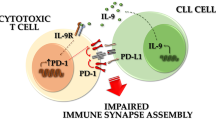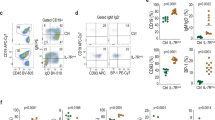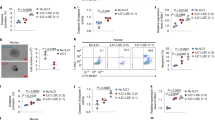Abstract
To explore the feasibility of designing vaccination protocols in acute leukemia patients with cytokine gene-transduced leukemic cells, we studied in vitro the growth potential of human leukemic cells transduced with the interleukin-2 (IL-2), IL-7, or IL-7 plus IL-2 genes, as well as the capacity of generating both autologous and allogeneic cytotoxic lymphocytes directed against the parental cells. A lymphoblastic T-cell line, ST4, obtained from a patient in long-lasting complete remission, was retrovirally engineered with the IL-2, IL-7, and IL-7 plus IL-2 genes; in addition, clones releasing different amounts of the cytokines were obtained by limiting dilution. Mixed lymphocyte-tumor cultures (MLTCs) were set up with parental or transduced leukemic cells as stimulators and with autologous or allogeneic lymphocytes as responders. When nonirradiated ST4 parental cells or clones producing <50 international units (IU)/mL/106 cells/72 hours of IL-2 were used as stimulators, leukemic overgrowth was observed in MLTCs within 16 days of culture. When clones producing >80 IU/mL/106 cells/72 hours of IL-2 were used as stimulators, the proliferation of leukemic cells was blocked and the transduced leukemic cells were completely cleared from the cultures by day 16; repeated restimulations with IL-2-producing leukemic cells were required to sustain long-term lymphocyte survival. On the contrary, when IL-7- or IL-7-IL-2-producing cells were used as stimulators, only a delay in leukemic cell overgrowth was observed, and lymphocytes were completely cleared from the cultures after day 60. IL-7 production by the different clones ranged between 11 and 36 ng/mL/106 cells/72 hours, whereas the highest IL-2-producing IL-7-IL-2 clone released 50 IU/mL/106 cells/72 hours of IL-2. When the stimulator efficacy of the highest IL-2-producing clone (ST4/IL-2#A7) was compared with that of exogenous IL-2 plus parental cells, a 7-fold higher amount of exogenous IL-2 was required to achieve the same results obtained with IL-2-producing leukemic cells. Autologous and allogeneic long-term MLTCs (up to 35 days) with ST4/IL-2#A7 as the stimulator were capable of generating cytotoxic effectors equally endowed with both major histocompatibility complex (MHC) class I-unrestricted and -restricted activity against parental ST4 cells. By day 18 of both autologous and allogeneic cultures, a substantial proportion of CD56+ cells was consistently recorded; this was coupled to a predominantly MHC-unrestricted cytotoxic activity directed against parental ST4 cells. CD56+ cells decreased considerably at the end of the different MLTCs, together with the unrestricted cytotoxic activity. At this time, >50% of the cells were CD8+, and 55% of the activity could be blocked by an anti-MHC class I monoclonal antibody. The results of this study demonstrate that IL-2 gene-transduced human acute leukemia cells cocultured with both autologous and allogeneic lymphocytes are capable of inducing a strong MHC-unrestricted anti-leukemic activity and subsequently “educating” MHC class I-restricted anti-leukemic effectors. The evidence that the immunogenic potential of human leukemic blasts can be boosted after transfer of the IL-2 gene suggests that the possibility of using leukemic cells engineered to release IL-2 as a therapeutic vaccine needs to be explored further.
This is a preview of subscription content, access via your institution
Access options
Subscribe to this journal
Receive 12 print issues and online access
$259.00 per year
only $21.58 per issue
Buy this article
- Purchase on SpringerLink
- Instant access to the full article PDF.
USD 39.95
Prices may be subject to local taxes which are calculated during checkout
Similar content being viewed by others
Author information
Authors and Affiliations
Corresponding author
Rights and permissions
About this article
Cite this article
Cignetti, A., Guarini, A., Gillio Tos, A. et al. Interleukin-2 gene-transduced human leukemic cells induce major histocompatibility complex-restricted and -unrestricted anti-leukemic effectors in mixed lymphocyte-tumor cultures. Cancer Gene Ther 7, 167–176 (2000). https://doi.org/10.1038/sj.cgt.7700107
Received:
Accepted:
Published:
Issue date:
DOI: https://doi.org/10.1038/sj.cgt.7700107
Keywords
This article is cited by
-
Investigation of inducing effect of specific cytotoxicity of CTLS by antigen peptides from T lymphocytic leukemia cells
Chinese Journal of Cancer Research (2003)



